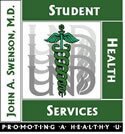|
Sinusitis
Sinusitis or sinus infections are swollen or infected sinuses. Sinuses are hollow spaces in the skull above the eyebrows, which normally produce watery mucus. When the sinus membranes swell due to colds, flu, allergies, smoke, or air pollution the mucus doesn't drain, which makes the cilia stop moving efficiently. When these changes in the membranes allow bacteria to invade, a sinus infection results.
Symptoms of sinusitis include:
- Stuffy head
- Sinus pressure or headaches
- Facial pain over the sinuses
- Sore throat
- Cough
- Thick and/or colored mucus
- Pain in the upper teeth
- Fever
Home treatment of sinusitis includes:
- Drinking lots of fluids to keep nasal discharge thin.
- Avoiding cigarette smoke, allergens, and other irritants.
- Blowing the nose gently.
- Taking a hot shower, or using a humidifier.
- Gargling with warm salt-water.
- Using over-the-counter treatments including decongestants, antihistamines, salt-water sprays, and ibuprofen.
To avoid developing sinusitis during a cold or allergy attack:
- Use an oral decongestant or a short course of nasal spray decongestant.
- Gently blow your nose, blocking one nostril while blowing through the other.
-
Avoid air travel. If you must fly, use a nasal spray decongestant before take-off to prevent blockage of the sinuses.
- If you have allergies, try to avoid contact with things that trigger attacks. If you cannot avoid exposure, use over-the-counter or prescription antihistamines and/or a prescription nasal spray to control allergy attacks.
To prevent recurring sinus infections:
- Stop smoking.
- Wash your hands often and keep hands away from mouth, nose, and eyes.
- Consider getting a flu shot each year.
- If you get a cold or flu, take care of yourself right away.
You should see a health care provider if:
- Home treatment gives no relief after two to four days.
- A cold hasn't gotten better after 10-14 days.
- Cold symptoms get worse after they had started getting better.
- Headache or facial pain is severe and doesn't respond to pain-relievers such as aspirin.
- Your vision gets blurry or swelling around your eyes is notable.
- After five to seven days of a cold, the color of the mucus changes from clear to yellow or green.
- You have a fever, especially if you also have colored mucus.
Resource Links:
v National Institute of Health. National Institute of Allergy and Infectious Diseases. (www.niaid.nih.gov/factsheets/sinusitis.htm)
v MEDLINEplus, National Library of Medicine.
(www.nlm.nih.gov/medlineplus/sinusitis.html)
v Joint Council of Allergy, Asthma, and Immunology. (www.jcaai.org)
v American Academy of Otolaryngology-Head and Neck Surgery, Inc. (www.entnet.org/ent-press/search_results.cfm) use search word sinusitus
v 20 Questions About Your Sinuses. (www.entnet.org/spam_q&a.html)
v AAFP, Family Health Facts. (http://familydoctor.org/healthfacts/163/nav.html)
 Back to Top 20 Health Issues Back to Top 20 Health Issues
|
|


